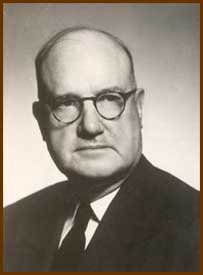 Yesterday we looked at the life and ministry of Dr. T. Stanley Soltau, missionary to Korea, pastor, and director of World Presbyterian Missions. Today we turn to Dr. Soltau’s little booklet, Our Sufficiency, for our Sunday sermon.
Yesterday we looked at the life and ministry of Dr. T. Stanley Soltau, missionary to Korea, pastor, and director of World Presbyterian Missions. Today we turn to Dr. Soltau’s little booklet, Our Sufficiency, for our Sunday sermon.
“OUR SUFFICIENCY IS OF GOD”
“Not that we are sufficient of ourselves, to account anything as from ourselves; but our sufficiency is from God.” — 2 Corinthians 3:5
In this day of want and poverty in so many parts of the world, when even the bare necessities of life are hardly sufficient to meet the needs of millions, and when even in this favored land we have been warned of certain restrictions which we must face in order that in other countries starvation may be avoided; in days like this it is always encouraging to think of one source of sufficiency which never fails and never can fail, and a source which is always accessible.
The Apostle Paul in writing to his friends in the great city of Corinth, says, “Our Sufficiency is of God.” He is writing to Christians who were living in a city whose name was a synonym for vice and immorality, it was also a city famous for its commerce and culture; and when great wealth, and great education and great wickedness go hand in hand, it always makes things difficult for a real believer in Christ Jesus. In spite of that discouraging background however, Paul writes to his friends there telling them that they are an epistle or a letter to Christ, written by the Holy Spirit on their hearts; that is, their lives were so different from what they had been before knowing Christ, and so different from the lives of others, that it was clear to all that the Holy Spirit had made Christ Jesus not only real to them but real through them to others. The Apostle then goes on to say that he has this confidence that the testimony of their lives will continue because God is working in them just as He has worked in Paul himself, and will prove His sufficiency by making them competent in exactly the same way in which He made Paul, and those with him, competent for the work to which He has called them.
The word “Sufficiency” in the Greek includes the idea of being made competent, competent for whatever situation may arise or for whatever task which God may call upon you to perform.
Any man who possesses this conviction has a freedom from anxiety and a quiet peace and assurance in these days of uncertainty and difficulty that will carry him through to victory. I wonder if you can say “My Sufficiency is of God . . . He has made me competent, by the working of His Holy Spirit in me, for every emergency and every responsibility that I shall meet this day.” Can you say it and really mean it? If you can, then thank God for it and begin from this minute to practice it and to experience His sufficiency in your life. If you cannot say so, then ask yourself why.
He has made it possible for all if they will only meet His conditions, which are:
1. A humble and sincere confession of their own sins and helplessness.
2. A grateful acceptance of the Sacrifice of His Son Jesus Christ on behalf of their sins, and then a joyful submitting of themselves, body, soul and spirit to Him; and a conscientious seeking to put Him first in all things, and a looking to Him for daily guidance and enabling power in all the decisions and activities of their lives.
As soon as that is done, His Spirit begins His gracious ministry in their hearts in order to make them competent and equipped to live victorious and powerful lives to His honour and glory.
It is a very helpful thing at the beginning of each day to remember this, and in faith to claim the equipment from the Lord, which He sees that we will NEED to meet the various temptations and testings which lie ahead of us; and then to start out the days work in assurance that He had prepared us for it. Let us do so now!
Our God and Father, as we bow in Thy presence at the beginning of this day, we ask Thee to equip us with all that we shall need to live for Thy honour and glory, and to please Thee in all things. In the name of Thy Son Jesus Christ our Lord we pray. Amen.
